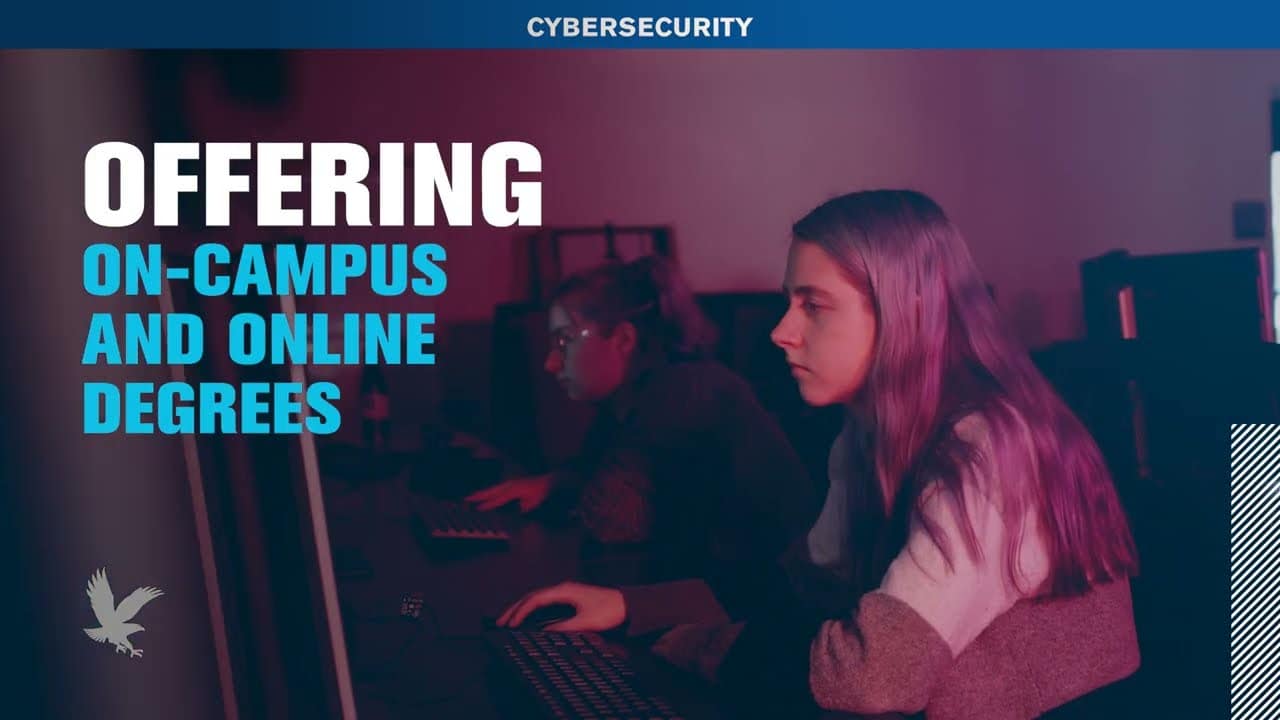
Bachelor of Science in
Cyber Intelligence and Security
Embry Riddle students learn to collect and analyze threat intelligence and secure against threats in The Bachelor of Science in Cyber Intelligence and Security.
About the Bachelor of Science in Cyber Intelligence and Security
Through a unique blend of computer science, engineering, intelligence gathering, security and management, Embry-Riddle's Bachelor of Science in Cyber Intelligence & Security will prepare graduates to lead, manage, administer and even establish organizations focused on cybersecurity. It is one of very few programs accredited by the ABET Computing Accreditation Commission and designated as a National Center of Academic Excellence for Cyber Defense program of study.
The program is in one of the first colleges of Business, Security and Intelligence in the U.S., allowing students to experiment in computer forensics, intrusion detection, computer security and threat analysis. Led by a faculty whose wide range of knowledge and expertise spans government, academia and computer science roles, the Cyber Intelligence & Security program offers a high-tech, hands-on academic experience in the “Cyber Lab” and a makerspace in the brand new Cyber Gym Makerspace.
Student Learning Outcomes
Student outcomes describe what students are expected to know and be able to do by the time of graduation. These relate to the knowledge, skills and behaviors that students acquire as they progress through the program. Graduates of the program will have an ability to:
- Analyze a complex computing problem and to apply principles of computing and other relevant disciplines to identify solutions.
- Design, implement, and evaluate a computing-based solution to meet a given set of computing requirements in the context of the program’s discipline.
- Communicate effectively in a variety of professional contexts.
- Recognize professional responsibilities and make informed judgments in computing practice based on legal and ethical principles.
- Function effectively as a member or leader of a team engaged in activities appropriate to the program’s discipline.
- Apply security principles and practices to maintain operations in the presence of risks and threats.
Cyber Intelligence and Security Career Opportunities
Careers and Employers
Embry Riddle graduates are set to enter the workforce in top companies, including Amazon, American Express, Boeing, Collins Aerospace, Department of Defense, Honeywell, Microsoft, Lockheed Martin, MITRE, NASA, Northrop Grumman, Raytheon, Sandia National Labs and many more public and private sector organizations, with a successful placement rate of 100% within a year of graduation.
Graduates looking to work in cyber security often secure roles such as:
- Cyber Defense Technologists
- Cyber Engineers
- Cyber Risk Analysts
- Cyber Security Analysts
- Incident Response Manager
- Security Operations Center Analyst
Cyber Intelligence and Security Salary Information
With growing cybersecurity career opportunities, Embry-Riddle provides the opportunity for competitive salaries, with alumni averaging $74,800 annually one-year post graduation, as of 2022.
DETAILS
About Cyber Intelligence and Security at the Prescott, AZ Campus
The Bachelor of Science in Cyber Intelligence and Security program prepares graduates to deal with threats from those who abuse our world’s growing dependency on technology.
The National Security Agency (NSA) and the Department of Homeland Security (DHS) jointly sponsor the National Centers of Academic Excellence in Cyber Defense (CAE-CD) program and have the Prescott Campus as an NSA/DHS CAE-CD institution with its cyber intelligence program meeting their stringent criteria.
Apart from the Cyber Lab and the Cyber Gym Makerspace, students even have access to specialized labs like the Global Security Operations Center (GSOC).
Cyber Intelligence and Security Information
- Credits: 120
- Online or In-Person: In-Person
- Capstone: Thesis, Project or Internship
Professional Accreditation
The Bachelor of Science in Cyber Intelligence and Security is accredited by the Computing Accreditation Commission of ABET, under the commission’s General Criteria and Program Criteria for Cybersecurity and Similarly Named Computing Programs.
Helpful Links
- Tour our Prescott Campus
- Discover the Department's Faculty
- Explore the Fields of Study: Security Intelligence and Safety & Computers and Technology
- Find Related Clubs & Organizations
Student Learning Outcomes
Students will:
- Apply principles of computing and other relevant disciplines to analyze and solve complex computing problems.
- Implement computing-based solutions to meet specific computing requirements within their program’s discipline.
- Communicate effectively in a variety of professional contexts.
- Observe professional responsibilities to make informed judgments in computing practice based on legal and ethical principles.
- Function effectively as members or leaders of teams engaged in activities appropriate to their program’s discipline.
- Apply security principles and practices to maintain operations in the presence of risks and threats.
Degree Requirements
The Bachelor of Science degree in Cyber Intelligence and Security requires successful completion of a minimum of 120 credit hours and is normally completed in eight semesters. Students choose one of three options as a part of their senior capstone - either a project, a thesis, or internship/co-op program. Some courses may require prerequisite subject knowledge or particular class standing. Course descriptions should be reviewed prior to registration to ensure proper placement.
The National Security Agency (NSA) and the Department of Homeland Security (DHS) jointly sponsor the National Centers of Academic Excellence in Cyber Defense (CAE-CD) program, and have designated the Prescott Campus as a NSA/DHS CAE-CD institution with its degree programs in Cyber Intelligence and Security meeting their stringent criteria.
Embry-Riddle is a sponsor and mentor for the National Cyber Patriot program and a member of the National CyberWatch Network.
In order to be awarded this degree, a student is required to complete a minimum of 80% of the core in residence or transfer those credits from institutions approved by the Department Chair.
Students should follow the suggested course of study--taking 200, 300, and 400 level courses in sequence--unless otherwise approved by the Department Chair. This will provide the student with the greatest chance of success.
Program Requirements General Education
Embry-Riddle degree programs require students to complete a minimum of 36 hours of General Education coursework. For a full description of Embry-Riddle General Education guidelines, please see the General Education section of this catalog.
Students may choose other classes outside of their requirements, but doing so can result in the student having to complete more than the degree's 120 credit hours. This will result in additional time and cost to the student.
| Communication Theory and Skills | 9 | |
| Computer Science/Information Technology | 3 | |
| Mathematics | 6 | |
| Physical and Life Sciences (Natural Sciences) | 6 | |
| Humanities and Social Sciences | 12 | |
3 hours of Lower-Level Humanities | ||
3 hours of Lower-Level Social Science | ||
3 hours of Lower-Level or Upper-Level Humanities or Social Science | ||
3 hours of Upper-Level Humanities or Social Science | ||
| Total Credits | 36 | |
Cyber Intelligence and Security Core (89 Credits)
The following course of study outlines the quickest and most cost-efficient route for students to earn their B.S. in Cyber Intelligence and Security. Students are encouraged to follow the course of study to ensure they complete all program required courses and their prerequisites within four years.
Courses in the core with a # will satisfy your general education requirements.
| ACC 210 | Financial Accounting | 3 |
| ACC 329 | Forensic Accounting and Fraud Examination | 3 |
| BA 201 | Principles of Management | 3 |
| CI 120 | Introduction to Cyber Security Majors | 3 |
| CI 201 | Introduction to Linux, Unix, Windows, and Scripting | 3 |
| CI 320 | Ethical Hacker - Pen Testing | 3 |
| CI 330 | Software Security | 3 |
| CI 340 | Database System Security | 3 |
| CI 410 | Malware Analysis | 3 |
| CI 460 | Big Data Analytics and Machine Learning | 3 |
| COM 122 | English Composition # | 3 |
| COM 219 | Speech # | 3 |
| COM 223 | Intelligence Writing # | 3 |
| CS 118 | Fundamentals of Computer Programming # | 3 |
| CS 125 | Computer Science I | 4 |
| CS 213 | Introduction to Computer Networks | 3 |
| CS 304 | Introduction to Computer Forensics | 3 |
| CS 315 | Data Structures and Analysis of Algorithms | 3 |
| CS 420 | Operating Systems | 3 |
| General Education - Humanities Lower-Level Elective # | 3 | |
| General Education - Humanities or Social Science Lower-Level Elective # | 3 | |
| General Education - Humanities or Social Science Upper-Level Elective # | 3 | |
| General Education - Natural Science Elective (One must include a lab) # | 7 | |
| General Education - Social Science Lower-Level Elective # | 3 | |
| MA 111 | Pre-Calculus for Aviation # | 3 |
| MA 112 | Applied Calculus for Aviation # | 3 |
| MA 225 | Introduction to Discrete Structures | 3 |
| MA 314 | Applied Linear Algebra & Statistics | 3 |
Intelligence and Security Concentration (21 Credits)
| CI 310 | Intelligence, Surveillance and Reconnaissance | 3 |
| CI 311 | Securing Computer Networks | 3 |
| CI 450 | Computer Forensics II | 3 |
| CS 303 | Cryptography and Network Security | 3 |
| CS 432 | Information and Computer Security | 3 |
| SIS 210 | Security Fundamentals | 3 |
| SIS 315 | Studies in Global Intelligence I | 3 |
Senior Capstone (3 Credits)
| Choose one of the following: | ||
| CI 475 | Cyber Senior Thesis | 3 |
| CI 490 | Cyber Capstone Project | 3 |
| CECIS 497 | Cooperative Education Cyber Intelligence and Security | 3 |
Open Electives (7 Credits)
| Open Electives | 7 | |
| Total Credits | 120 | |
- #
General Education Course
All Army ROTC students are required to complete SS 321 - U.S. Military History 1900-Present (3 credits) in order to commission.
Suggested Plan of Study
| Freshman Year | ||
|---|---|---|
| Fall | Credits | |
| CI 120 | Introduction to Cyber Security Majors | 3 |
| COM 122 | English Composition | 3 |
| CS 118 | Fundamentals of Computer Programming | 3 |
| MA 111 | Pre-Calculus for Aviation | 3 |
| Social Science Lower-Level Elective | 3 | |
| UNIV 101 | College Success | (1) |
| Credits Subtotal | 15.0 | |
| Spring | ||
| BA 201 | Principles of Management | 3 |
| CI 201 | Introduction to Linux, Unix, Windows, and Scripting | 3 |
| CS 125 | Computer Science I | 4 |
| Humanities Lower-Level Elective | 3 | |
| MA 112 | Applied Calculus for Aviation | 3 |
| Credits Subtotal | 16.0 | |
| Sophomore Year | ||
| Fall | ||
| COM 223 | Intelligence Writing | 3 |
| CS 213 | Introduction to Computer Networks | 3 |
| CS 315 | Data Structures and Analysis of Algorithms | 3 |
| MA 225 | Introduction to Discrete Structures | 3 |
| Natural Science Elective | 3 | |
| Credits Subtotal | 15.0 | |
| Spring | ||
| ACC 210 | Financial Accounting | 3 |
| CI 311 | Securing Computer Networks | 3 |
| CS 303 | Cryptography and Network Security | 3 |
| MA 314 | Applied Linear Algebra & Statistics | 3 |
| Natural Science Elective with Lab | 4 | |
| Credits Subtotal | 16.0 | |
| Junior Year | ||
| Fall | ||
| CI 320 | Ethical Hacker - Pen Testing | 3 |
| CI 330 | Software Security | 3 |
| CS 304 | Introduction to Computer Forensics | 3 |
| Humanities or Social Science Lower-Level Elective | 3 | |
| SIS 210 | Security Fundamentals | 3 |
| Credits Subtotal | 15.0 | |
| Spring | ||
| CI 340 | Database System Security | 3 |
| CI 450 | Computer Forensics II | 3 |
| COM 219 | Speech | 3 |
| Open Elective | 3 | |
| SIS 315 | Studies in Global Intelligence I | 3 |
| Credits Subtotal | 15.0 | |
| Senior Year | ||
| Fall | ||
| ACC 329 | Forensic Accounting and Fraud Examination | 3 |
| CI 460 | Big Data Analytics and Machine Learning | 3 |
| CS 420 | Operating Systems | 3 |
| Humanities or Social Science Upper-Level Elective | 3 | |
| Open Elective | 4 | |
| Credits Subtotal | 16.0 | |
| Spring | ||
| CI 310 | Intelligence, Surveillance and Reconnaissance | 3 |
| CI 410 | Malware Analysis | 3 |
| CS 432 | Information and Computer Security | 3 |
| Senior Capstone | 3 | |
| Credits Subtotal | 12.0 | |
| Credits Total: | 120.0 | |
Get Started Now:
Summary
120 Credits
Estimate your tuition by using the Tuition Calculator
View Financial Aid Information
Learn about our General Education
Find out about transferring credits to this degree
Learn more about our Veterans & Military benefits
View our Academic Calendar




